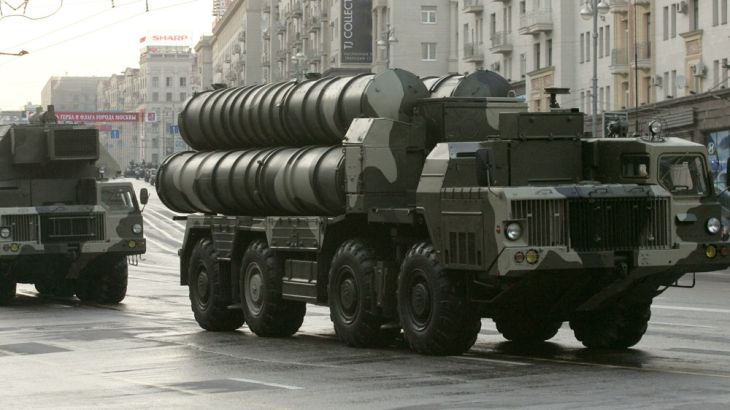Will supply of S-300 to Syria harm Russia-Israel ties?
S-300 move is Moscow’s message to Israel to adopt restraint, experts say, but some doubt the transfer will happen.

Moscow’s decision to supply Syria with S-300 missile system has met a strong reaction from Israel but experts say the move will not risk the Israel-Russian relationship.
Some analysts doubted Russia will actually transfer the S-300 to the government of President Bashar al-Assad, who has presided over more than seven-year-old civil war.
Russian Defence Minister Sergei Shoigu said on Monday his country would “transfer the modern S-300 air defence system to the Syrian armed forces within two weeks” – the same day the Kremlin accused Israel pilots of “premeditated actions” over the drowning of a Russian plane that killed 15 soldiers last week.
Russian officials had described manoeuvres by Israeli fighter jets during the incident as “hostile” and have accused Israel of violating Syria’s sovereignty, breaching the Russian-Israeli de-confliction agreement.
For several years, Israel and Russia have maintained a special hotline to prevent their air forces from clashing overcrowded skies over Syria.
The most recent incident was the worst case of friendly fire between Russia and Syria.
It posed a threat to the two countries’ relationship, which Moscow has maintained since it intervened militarily in the country three years ago.
Syria’s military previously owned a defence system that is less sophisticated from the S-300, but the long-range surface-to-air missile can spread across hundreds of kilometres and can be used to defend against aircraft and missile attacks and fire targets on the ground.
Analysts say Moscow’s announcement is a “dangerous development” in the region, as the missile system would challenge the Israeli air power capacity.
Russia-Israel relationship ‘intact’
Israel has, in the past six years, carried out hundreds of attacks inside Syria, varying from firing rockets to air raids, which have increased in intensity and frequency since 2012 – when Iranian paramilitary fighters entered Syria following the start of the Syrian civil war.
Earlier this month, Israel admitted it launched 200 attacks inside Syria since last year.
Israeli Prime Minister Benjamin Netanyahu has blamed Iranian paramilitary units in Syria of breaching its sovereignty by carrying out over-the-border attacks, and has vowed to keep acting against Iranian assets in Syria.
Russia has largely turned a blind eye to the Israeli attacks, and analysts believe the latest dispute between the two countries will not affect their relationship.
“The relationship between Israel and Russia is much stronger than what people think when it comes to Syria,” said Samer Abboud, associate professor of Global Interdisciplinary Studies at Villanova University.
“There will be condemnation from ‘the West’, but behind the scenes, the line between the Russians and Israelis will remain intact due to agreements they are both abiding by,” Abboud told Al Jazeera from Pennsylvania in the US.
However, experts are sceptical whether Moscow, which had also promised Tehran the S-400 – the most advanced version of the missile defence – is going to follow through on its pledge.
Russia to ‘limit’ Israeli strikes
The transfer of the S-300 to Syria is a “long-running saga,” according to Aron Lund, a fellow with The Century Foundation think-tank.
“Russia has kept hinting that it will supply these missiles to Damascus since 2011, but never went through with it,” Lund said, even though with the two-week deadline, it is declaring much “louder and clearer” its intention to complete the transfer.
“It’s basically been a pressure tactic on Russia’s part. They drop the S-300 back into the media whenever they feel the Israelis are not paying attention.”
Similarly, Omar Kouch, a Syrian political analyst, noted that both the US – present in Syria’s northeastern region – and its closest ally Israel consider the delivery of this missile to the regime as “a significant escalation”.
US National Security Adviser John Bolton, on Monday, said the decision to transfer S-300 to Syria was “a major mistake“, and urged Moscow to reconsider its decision.
“This is still a promise … so, we’re not sure if Moscow is going to go through with it,” Kouch told Al Jazeera.
Nonetheless, Abboud believes that the move by Russia has sent a message to Israel that its intervention in Syria needs to be limited.
“A few years ago the targets were strategic, but now they’re spreading and becoming more sporadic,” he said.
When asked whether the death of 15 Russian soldiers played a role in Moscow’s decision, Abboud said the casualties were an “opportunity to impose the limit”.
“The move was a boost to Iran and the Syrian regime,” he said.
Some of the last string of attacks have targeted airbases and facilities in the Syrian capital, Damascus, where Assad’s government sits.
In August, Syrian state media reported the Syrian army confronted a “hostile target” breaching the country’s airspace west of Damascus, while in June, two Israeli missiles struck targets near Damascus airport.
With the new missile system, the government can at least ensure Damascus’ safety from incoming attacks, Abboud noted.